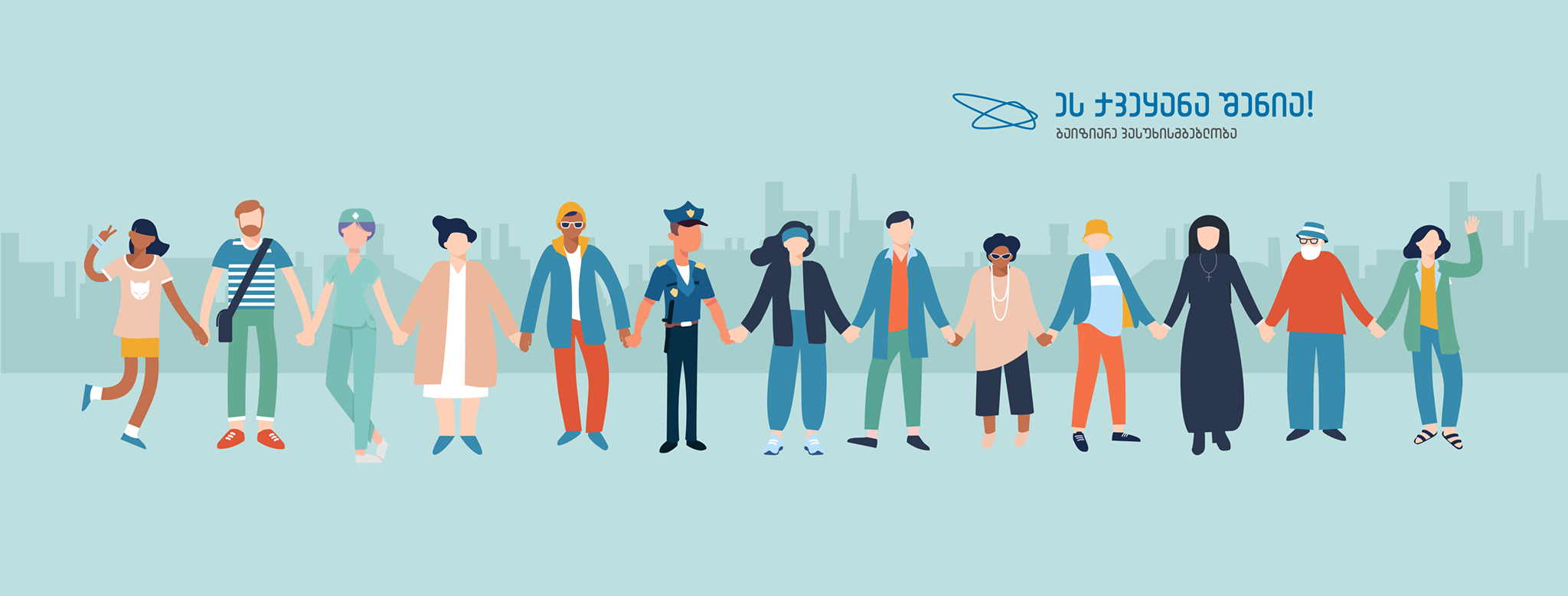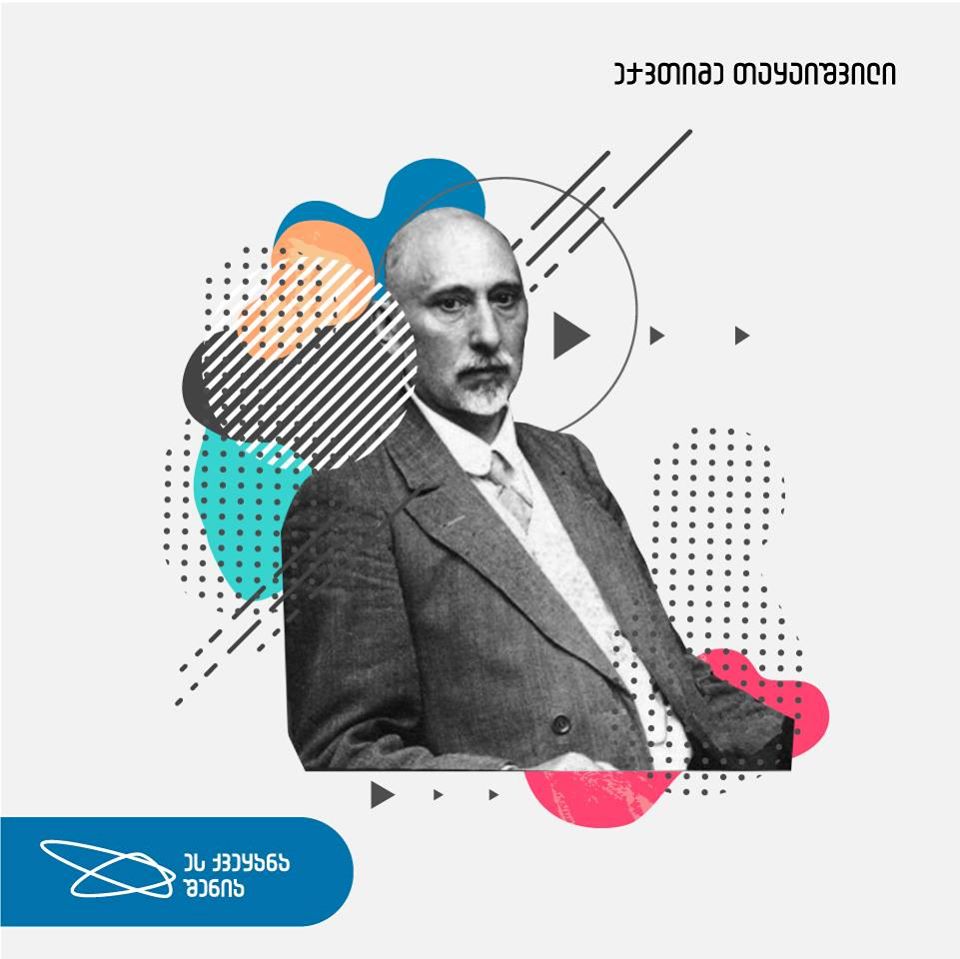‘’We Are a Western-Type Civil Society...’’
Popular





CSO web portal has interviewed Davit Losaberidze about the civil society and CSOs, i.e. non-governmental organizations.
Interviewed by Lali Shalvashvili
Let's start with the civil society. There is an ongoing worldwide discussion over this issue, on some occasions this term implies only the unity of non-governmental organizations, and sometimes it has a broader meaning... How do you interpret civil society?
Davit Losaberidze – There are broad and narrow interpretations of the civil society, but intermediate versions also exist. Here, based on the history and mindset of the society, non-governmental organizations are perceived more as the civil society and there are reasons for it. During the Soviet rule all kinds of activities were simulated. After its collapse, the society became allergic to social, civil or any other activities, and it comprehended the state and business sectors as the only truth. Therefore, only organizations working with support from the western grants were considered as the civil society. As already noted, past life was the reason of allergic reaction. There was a civil society during the Soviet rule, but it was a quasi-civil society – e.g. the writers', composers', painters' unions, labor unions, Communist youth movement, etc., i.e. what had lost functions and was a supplement to the state administrative system, as well as attempted to swindle the West. It is a lie that during the Soviet times nobody looked and compared to the West – there were phrases like: "Let's catch up and overtake the US", or "Our is better", etc. Such competition stems from the complex of inferiority and is characteristic to the society with depreciated values. This does not mean it has no values at all, of course it has, but they are depreciated.
I personally agree with the opinion that the civil society is everything beyond a private life, family, state and business. Hence, we can regard civil activities as something not related to the state governance or discharge of business functions and gaining economic profits. In this sense, civil society is a broad term and covers non-governmental organizations, political parties, where people unite around some idea. This does not mean they do not fight for power, but they do fight for power in order to push through principles they believe in. Whether these principles are right or wrong is a different matter, but political parties also fall within the segment of a civil society. Further, there are professional unions, teachers' managers' and pensioners' unions, who do not strive to gain huge profits but to introduce certain values – promotion, advocacy. In this respect, civil segment includes religious organizations and media as a source of information and not as business. Moreover, neighbors sitting by a spring and discussing some issues – are a part of the civil society. This activity neither grows the harvest, cleans up the house, cooks a dinner, nor achieves economic wellbeing – this is a human desire to socialize. Such a form of life in this segment is a civil society. Georgian feast is also a civil society in this sense. In short – a unity of active, thinking people united by some common interests is a civil society.
You have thoroughly formulated the essence of the civil society as such, but it would be interesting to know your assessment of the civil society in Georgia. I am asking this because there are different opinions. Some say that the civil society is in embryonic form, or that it is underdeveloped, etc. What is your view? Does it manage to raise or advocate pressing issues?
Davit Losaberidze – In the first place, what one can see on surface is that the values in Georgia are mixed, but this is not a Georgian phenomenon and it's like this everywhere. We are in the search of ourselves – we don't have established visions, opinions yet, but this is not about citizens but about the so-called elite, intellectuals, who are characterized with extremities. Some say we are the best and how could someone teach us anything, and some say in a negative context we are behind someone, etc.
Can you refer to concrete, relevant examples...
Davit Losaberidze – Of course, the history of social-democracy and the development of advocates of liberal values in Georgia is a good example. We turned out to be greater Catholics than the Pope, and whatever the European socialists and social-democrats did not dream and think about seriously, in Georgia this became a reality and it was not accidental that the social-democrat and subsequently the Bolshevik ideologies as part of the Empire were nourished by the very Georgian element – Chkheidze, Tsereteli, then Stalin, Orjonikidze, Beria, etc. This was a divergence – "It's not good and better must be done and the Europeans do not know" – this is characteristic to a type of thinking of the Mediterranean society (Spain, Italy – especially its South – Sicily, Greece, Asia Minor, Levant, Caucasus). We are not immoral society but we are the society without morals and shift responsibility on others – "devil has seduced me", "s/he has put an evil eye on me", etc. The unity of such individuals has difficulties in finding its own objective and starts looking for a patron. That's why we often hear – I wish Stalin or Aghmashenebeli would come to life, or beloved Bidzina or Misha – we are constantly looking for someone who would do something. I'm not saying the entire society is like this, but whoever has ambitions for elitism, they are full of such element, are afraid of responsibility and are driven with a desire to blame everything on others.
I can bring a second example from the contemporary history – Georgian libertarians turned out to be greater libertarians than those in the homeland of libertarianism. No one discusses radical liberalism unilaterally in the homeland of liberalism. Let's take one of Friedman's discussions as an example, in which he proves why the Ministry of Defense must not be commercialized: it surely could become a business with less expenses, no? He asks a question and answers it himself – in case of business, it can easily calculate that losing a war would bring it more profit and therefore an army may directly surrender to an enemy. Hence, there are circumstances beyond an economic expediency, which should be taken into account. Second example – in the United States, where there is a liberal system, when one of the strategic objects – a large port was on sale and the citizens of America's allied countries – United Arab Emirates and Kuwait expressed interest in purchasing it, the US Government has blocked these offers and has sold the port for a much smaller price to Americans. Georgian libertarians have turned a blind eye to such examples and we all remember the phrase that "Everything is on sale except for the honor". I wanted to show with these examples that we end up in extremities, which is a cultural provincialism. It's also provincialism what we often hear about the civil society – we are not good, the Georgian civil society is only a feast really and nothing else, or we are Asia and who would bring us to the Europe. On the other hand we hear – how come someone could teach us something, we are such an old and tolerant people. Such assessments are characteristic to those with an ambition to have answers to all questions.
Importantly, we must take into account that stating that the civil society is in embryonic form or that it starts existing now is definitely wrong. Of course it's also wrong to state that in the 7th Century B.C. we had a civil society that is still a model for the Americans. We are the nation, ethnos with thousands-year-old culture, which is still being formed. We have disadvantages and advantages, we are like others in something and different in something else, we have our individual face, we are behind others in something and ahead of others in something else. We should simply understand what we want and how we should behave.
As for the facts from the history of the Georgian civil society: the first non-governmental organization in 1879 was established not by the businessman, judge and politician Ilia Chavchavadze, but by the "non-governmental activist" Ilia Chavchavadze and it was the "Society for Spreading Literacy". The roots of the civil society lied in those rural meetings in Guria, when the population gathered to discuss global politics, or when the residents of Kartli or Kakheti decided at village assemblies how to build a channel in the village, etc. Those saying that no such experience exists, should at least negate these facts, better corroborate their opinions, and bring relevant examples.
You have referred to experience from the 19th Century... This was an initiative from the bottom, can you draw parallels with the current situation?
Davit Losaberidze – When one talks about the society's ripeness or its failure to ripen, we often hear the phrase that the civil society has matured or has failed to mature, but let's say yoghurt can mature but not the civil society – this is a constantly developing process. I'll bring one example from the current reality. In 2014, amendments were made to the Election Code on April 19, by which the citizens' initiative groups were given the right to nominate independent candidates at the elections. Signed amendments were published on April 24, and the deadline for nominating the candidates was expiring on April 29. As our intellectuals would say, our "unprepared and bad society" managed to set up initiative groups in five days in all municipalities of Georgia, and 15 thousand citizens have not only understood and comprehended this information, but they have nominated up to 3 thousand candidates at the elections. For some reason, people talk about Elisashvili only, but if we look at the percentage of winners in the elections, the ruling party in the Sakrebulos (city council) is followed by the very independent candidates. Anyone can search for these statistics. I'm not saying these candidates were winged angels or were not driven by different interests, but it's a fact that the society has managed to initiate its vision, which means that the society understood all of this within 5 days and it seems it has felt this moment intuitively, understanding that something must have been done. No one could say that these 15 thousand people read the Legislative Herald online on a daily basis and get familiar with legal amendments. Therefore, saying that the society has not ripened is not correct.
Let's move to non-governmental, i.e. civil society organizations. You have mentioned that a certain stereotype of organizations was created after the collapse of the Soviet Union. Can this explain the current attitude of certain members of the society towards CSOs or this is one of the reasons?
Davit Losaberidze – There are lots of reasons. Yet, a significant role in this respect is played by the state, establishment, which often deliberately and upon need pursues campaign against the civil society. This applies to the rule of Gamsakhurdia, Shevardnadze, as well as Saakashvili and the "Georgian Dream" – both Ivanishvili and Gharibashvili. There are facts to prove this, which I know, but which I cannot state individually due to observance of ethical principles, moreover, when this would take place during the private talks. But in general I could say that many attacks against non-governmental organizations were financed from the state structures so that even the members of anti-movements were not aware of it. For instance, the Anti-Soros movement – as soon as the funding (project) was over, the movement was ended, and similar cases are indeed apparent. Nevertheless, certain part of the Society still believes that CSOs are traitors, devourers of the Christ, pagans, Masons, etc.
On the other hand, when you talk to a certain part of the society and cite the activists from the 19th Century, and when they find out that Ilia and the activists of his generation were raising the same issues that we confront today, they are extremely delighted with cleverness of Ilia Chavchavadze and almost no one comprehends that almost nothing has changed in this or that area for such a long period of time. Today we face the same problems and no one will solve them for us. Let's say no one will come from the USA or Burkina Faso to do our job.
As for the internal factors, let's start with sources of funding of CSOs – there is no huge practice of corporate social responsibility in Georgia. As a rule, business is assisting individual citizens in social hardship or builds churches. At that, this is happening spontaneously. Second form of funding is the state funding, and we can assert directly this was and is happening on political motives – usually ahead of the election processes. I'm not saying that all CSOs are perfect and without flaws, but part of them works in line with the interests of donors, which sometimes do not take into account the local needs. When you go to some village where people are hungry to explain to the locals why it is important to save Antarctic penguins or the Chinese panda, this will obviously fail as inadequate to the real public needs...
These are conventional examples probably, I have not even heard about such projects. How derailed is a chunk of projects implemented by CSOs from the real needs and problems?
Davit Losaberidze – It surely is. For instance, they were demanding in one of the projects to take into account the gender issue. I'm far from thinking that there is huge discrimination at legislative level in Georgia, but discrimination is evident at everyday level. When one of international funds says that we are so behind in this area that we should set up the councils and achieve such success at legislative level in protecting the women's rights as in Pakistan, it's a bit strange. Especially when they know very well that in case of a rape in Pakistan, a woman is stoned to death as a prostitute, and that the sharia law is in force in that country. They have other problems and we have others. Unfortunately, the concerns are being unified at international level, and a part of our CSOs follows project requirements, of course knowing there will be grants but no results.
Elitism is another problem of CSOs – they have formed even their own slang. We use terms "deadlines", "justifications", "outputs", "inputs", which are totally unclear for common citizens. Whereas, civil society exists because it should be civil and simple, everyone should understand everything.
These are the ins and outs of the CSOs, as well as their disadvantages. Let's turn to external problems now: in the 1990s it was prestigious to work in a non-governmental organization (even because of a relatively higher salary), and now it's not prestigious anymore because the civil service has taken over once again. The process was launched in 2003 and is continued successfully today. Everyone dashes towards the civil service. Business or other fields are limited and therefore this is the only guarantee for well-being. Thus, there is no ration in the third sector and if we look at CSOs from the age perspective, the sector is aging under a direct, biological meaning.
To sum up the disadvantages – those are the elitism of CSOs, dependence on donors and absence of own funding sources, political interests to discriminate against them, inadequate actions in response to public needs.
And advantages – what has the sector brought about after independence, i.e. does it have any positive achievements?
Davit Losaberidze – Professionalism was accumulated in the sector. In the 90s of the last century, academic segments as well as those characteristic to middle class were totally destroyed. Many systems were closed down, many were commercialized and the work on many issues has shifted to the very non-governmental sector – linguistics, social fields, etc. State sector representatives should not be offended but often the level of professionalism in the public sector is so low that CSOs are much stronger in justifying some issues. Yet, this does not mean that professionals are working in every CSO. Their share is small there as well, and sometimes part of CSOs works on and talks about such absurd things because of the grants that any soundly thinking civil servant could easily give a killer response.
However, I still think that qualification was somewhat accumulated in the non-governmental sector, and it is not accidental that people from the very non-governmental sector are recruited by the authorities. It's a fact that CSOs have some say. Even those who have no idea what a non-governmental sector is, do not know its history and look at it negatively, say they have discussed this or that issue with the CSOs. They say so because it's a good courtesy to have the CSOs involved, while there are over 10 thousand CSOs in the country and they all have their opinions, some of them are big, some small, and some exist on the paper only.
As for the civil society in general, the fact that several attempts of introducing authoritarian regime in our country have failed is the achievement of the very civil society. I mean not CSOs only, but the entire civil society. Georgian society could not put up with either excessive ultra-nationalism, corrupt clan system, or the southern type fascist authoritarian system. Of course a political battle was going on and one force was oppressing the other, but the decisive word in 1989, 2003 and 2012 was triggered by the public critical attitude – this is a result of gradual development of the Georgian society, and the fact that the public has this power and can do it means we are not an eastern-type society, we are a western-type society.
Can you draw parallels with the civil society of other countries, even post-socialist states...
Davit Losaberidze – Firstly: we are not as developed as let's say Slovenia or Poland, we don't have such a feeling of mass social responsibility as in Scandinavia. I think we are ahead of the Central Asian states, and are at the same level of civil society as in Egypt, Algeria, etc. We are ahead of the Central Africa, Latin American states, and are far more ahead of Russia, ahead of Armenia, and behind the Turkish civil society, again, far more ahead of Azerbaijan. Secondly: all of this relative and dependent on the environment and policies of the authorities – in Georgia the authorities could not manage to ignore the sector to the end. Thirdly: during the economic collapse part of people has found a small and free space in a non-governmental sector.
As already noted, we are not at the same level as the Turkish civil society; we remember 2 million people who have protested in Istanbul to protect the park. Although Turkey is a large country and 2 million are 2,5% of the population, but 2,5% of the Georgian population, i.e. 100 thousand people have not protested to protect a plane-tree in the street. Turkey has gone through the period we are experiencing at the moment in the 1980s, and it is therefore ahead of us. Now, when I observe the Ukrainian civil society and the development there, I'm remembering what we have gone through in the 1990s, and not because we are good, no, but because we are smaller, we were closer to the center of democratic developments and we were beaten earlier. At the end of 20s-30s of our century Russia will witness the same processes. This wave will reach Russia as well – I'm not saying whether this is good or bad, I'm just saying this will happen, but noting at the same time that this will be a dangerous phase for Russia's neighbors. We should find a good shelter before then – NATO or something else if available.
You have mentioned funding of CSOs. When experts talk about CSOs, they always stress that alternative sources of funding could not be identified and that the majority of organizations are not membership-based, which is viewed as one of the alternative sources of their income... What is your approach towards these issues?
Davit Losaberidze – Both opinions are correct. CSOs could be also blamed for this, but the activities of membership-based organizations are related to a number of difficulties. For instance, if I offer people to be independent observers at the elections and send them to another region for them not to have problems at their place of residence – will they take the documents and go? Most importantly, they should have free time, money and less problems. Is it expected that something like this happens in mass? Not unfortunately, because the society has a lot of problems and issues we have discussed is not its priority.
As for a dialogue with the business – Georgian business has a skeptical view of relations with CSOs. There is also a view that if one wants to do something, he could do it without money as well, but how could one manage this - go around the regions without money, one should eat something, spend a night somewhere, and if one wants to disseminate materials – he could print them. Nothing is possible without the time, human and all other resources...
Do CSOs manage to have influence on the authorities and the general public?
Davit Losaberidze – There is a certain influence on the authorities, especially when the interests of one part of the authorities and the civil society coincide at least partly. If political groups do not have anyone to draft their vision in certain areas – they use the resources of CSOs. I mean all Georgian authorities. Whether the authorities subsequently take into account these initiatives or not is a different matter. We won't listen to you because you're bad – one cannot hear something like this, but they tell us – we'll probe into this, let's see, but... etc. Relations with public are even graver, if you give them right messages, the society will surely react. For instance, let's remember "This Affects You Too", "Must Carry" and "Must Offer" campaigns, people have reacted rapidly not because they have suddenly fallen in love with the CSOs, but because the public interest was strong and it was fully mobilized in this regard. Obviously, other factors have also played their role and only this campaign was not decisive.
What are the values that the civil society should be built on...
Davit Losaberidze – Reacting to adequate interests of the society, or searching-identifying these interests and subsequently reacting. Further, professionalism and most comprehensive, which covers everything - Weber-like Protestant ethical norms – value-based and not overly-mercantile approaches.








